Does Chai Tea Have Caffeine
Chai tea typically contains caffeine. The amount, however, can vary depending on the ingredients and brewing method.
A standard 8-ounce cup of chai tea:
- Black tea-based chai: around 25-50 mg of caffeine
- Green tea-based chai: approximately 20-30 mg of caffeine
For comparison:
Bestsellers
- Coffee: about 95 mg per 8 ounces
- Brewed black tea: around 47 mg per 8 ounces
Factors affecting caffeine content:
- Type of tea: Black tea has more caffeine than green tea.
- Brewing time: Longer steeping increases caffeine content.
- Tea blend: Some chai blends may include additional spices or herbs, slightly altering caffeine levels.
Decaffeinated options exist if you prefer to avoid caffeine. Always check the packaging for caffeine information.
In summary,
- Chai based on black tea has more caffeine than green tea chai.
- Factors like brewing time and tea type influence caffeine levels.
- Decaffeinated chai is an alternative.
Factors Influencing Caffeine Levels in Chai Tea
Several factors influence caffeine levels in chai tea. The type of tea used in the blend plays a significant role.
Black Tea: Traditional chai typically uses black tea, which has higher caffeine content.
Green Tea: Some blends use green tea, which has less caffeine.
Brewing time and temperature also affect caffeine content. A longer steeping time or higher water temperature can extract more caffeine from the tea leaves.
Steeping Time: Longer steeping usually means higher caffeine content.
Water Temperature: Hotter water extracts more caffeine.
The ratio of tea to other ingredients is also important. Chai tea has various spices like cardamom, cinnamon, and ginger, which dilute caffeine concentration.
Tea-to-Spice Ratio: A higher proportion of tea increases caffeine levels.
Finally, the variety of tea leaves contributes to caffeine levels. Different types of Camellia sinensis leaves (the tea plant) contain varying caffeine quantities.
Leaf Variety: Different tea leaves have different caffeine levels.
Comparison of Chai Tea Caffeine to Other Teas
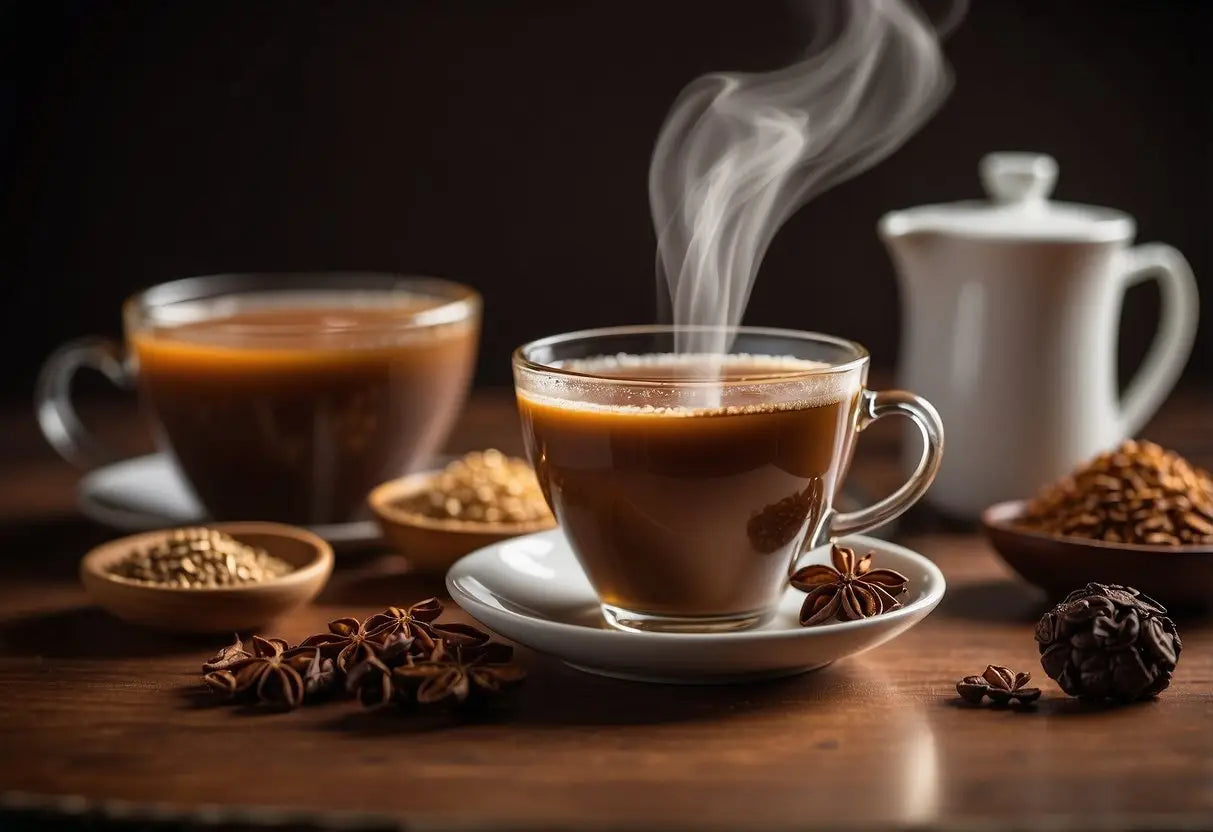
Lao Ban Zhang
When examining the caffeine content in chai tea, you will notice significant differences compared to other types of teas.
Chai Tea:
- Typically contains around 40-50 mg of caffeine per 8-ounce cup.
- Made with black tea, which contributes to its caffeine content.
Green Tea:
- Contains 20-45 mg of caffeine per 8-ounce cup.
- Generally lower in caffeine than chai.
Black Tea:
- Offers approximately 40-70 mg per 8-ounce serving.
- Very similar to chai tea, as chai is often based on black tea.
Oolong Tea:
- Has about 30-50 mg per 8-ounce cup.
- Falls between green tea and black tea in terms of caffeine.
- Contains roughly 15-30 mg of caffeine per 8-ounce cup.
- The least caffeinated among the common teas.
Here's a comparison table for clarity:
| Tea Type | Caffeine Content (mg per 8 oz cup) |
|---|---|
| Chai Tea | 40-50 |
| Green Tea | 20-45 |
| Black Tea | 40-70 |
| Oolong Tea | 30-50 |
| White Tea | 15-30 |
Understanding these differences can help you choose the best tea for your needs based on caffeine content.
Health Implications of Caffeine in Chai Tea
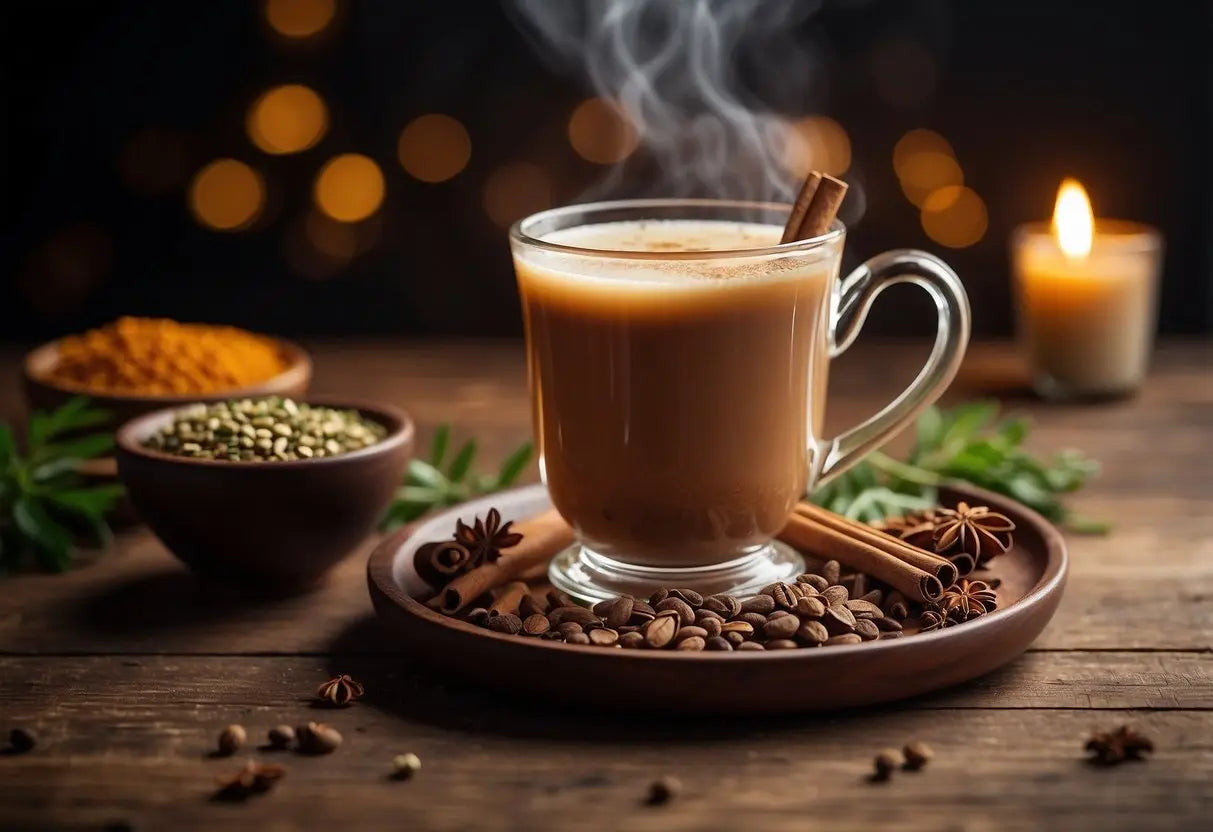
Chai tea contains a moderate amount of caffeine. Depending on the blend, a cup of chai may have between 20-60 milligrams of caffeine. This amount can impact your health in various ways.
Benefits of Caffeine in Chai Tea:
- Improved Alertness: Consuming chai tea can help you stay awake and focused.
- Boost in Metabolism: Caffeine can increase your metabolic rate, aiding in weight management.
- Enhanced Physical Performance: It may improve endurance and strength during physical activities.
Potential Drawbacks:
- Insomnia: Consuming chai tea late in the day can interfere with sleep.
- Anxiety: High caffeine intake may increase feelings of anxiety.
- Digestive Issues: Caffeine can sometimes cause acid reflux or upset stomach.
It is essential to consider your own tolerance to caffeine. For those sensitive, even moderate amounts in chai may lead to side effects like jitteriness or a rapid heartbeat.
Table: Caffeine Content Comparison
| Beverage | Caffeine Content (mg) |
|---|---|
| Chai Tea | 20-60 |
| Coffee | 95-200 |
| Green Tea | 25-45 |
Moderation is key. Enjoying chai tea while being mindful of its caffeine content can help you reap its benefits without adverse effects.
How to Determine Caffeine Content
To determine the caffeine content in chai tea, you need to consider several factors. Each of these can affect how much caffeine ends up in your cup.
Ingredients
Chai tea blends vary widely. The type of tea used (black, green, or white) significantly influences caffeine levels. Typically, black tea contains the most caffeine, ranging from 40-70 mg per 8-ounce cup.
Brewing Time
The duration you steep your chai also plays a role. Longer brewing times typically result in higher caffeine content. Steeping for 3-5 minutes is common, but some might let it brew longer for a stronger flavor and more caffeine.
Serving Size
Pay attention to the serving size. Caffeine content varies per ounce, so drinking a larger cup naturally means more caffeine. An 8-ounce cup usually contains 40-70 mg of caffeine, but a 12-ounce cup can increase that amount.
Type of Chai Tea
Different types of chai tea (like masala chai or herbal chai) have varying caffeine amounts. Masala chai typically contains black tea, thus more caffeine, whereas herbal chai may have little to none.
Pre-Packaged vs. Homemade
Pre-packaged chai tea drinks, including bottled or canned versions, often have labels indicating caffeine content. For homemade chai, you may need to estimate based on the tea used and brewing method.
Decaffeinated Options
Some chai tea comes in decaffeinated versions. These still contain minor amounts of caffeine but are far lower than regular chai. Checking the product label helps you confirm the exact content.
By considering these factors, you can estimate the caffeine content in your chai tea more accurately.
Decaffeinated Chai Tea Options
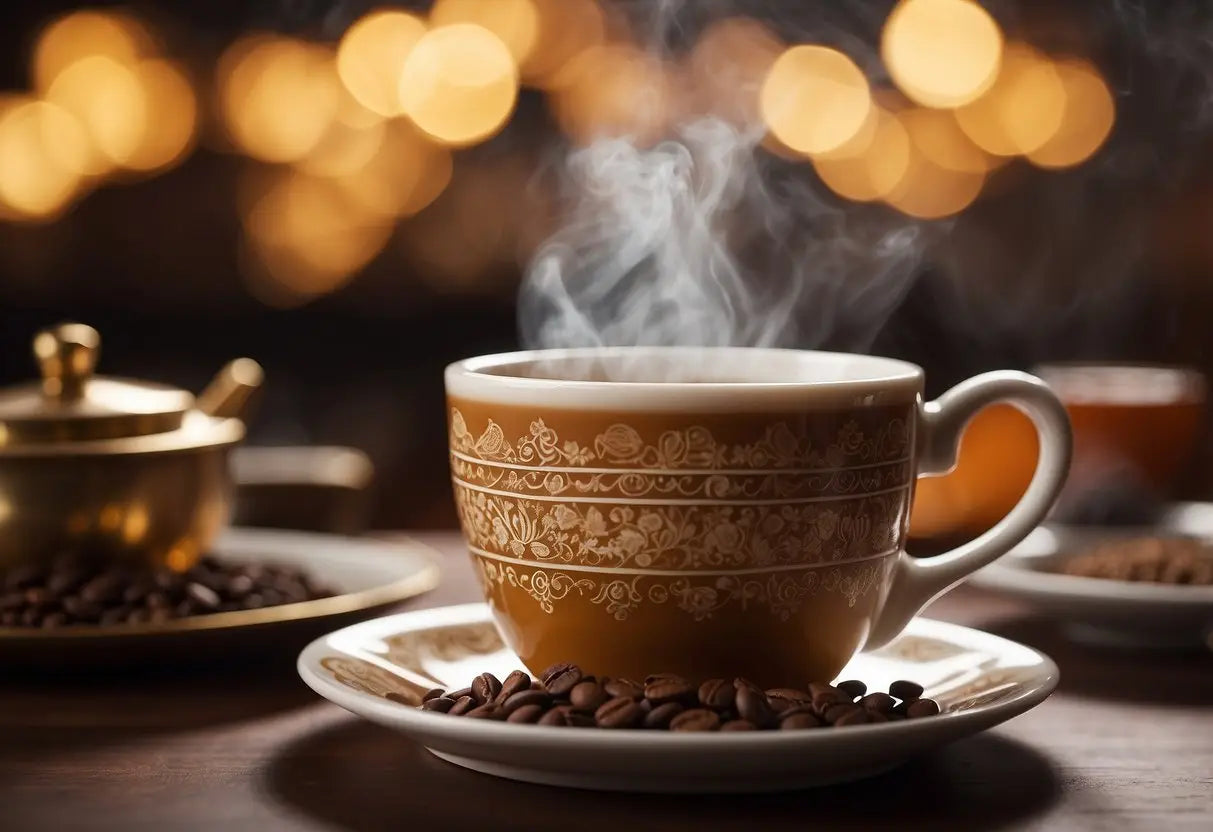
Decaffeinated chai tea offers you the same rich flavors without the caffeine. These options allow you to enjoy chai at any time of the day without disrupting your sleep.
Brands Offering Decaffeinated Chai Tea:
- Tazo: Known for a robust blend of spices.
- Twinings: Offers a smooth, decaf option.
- Stash: Provides a flavorful, caffeine-free chai.
You can also find loose-leaf options for more control over the brewing process. These tend to offer a more personalized flavor experience.
DIY Decaf Chai Blend:
- Black Tea Alternatives: Use rooibos or honeybush.
- Spices: Cinnamon, cardamom, cloves, and ginger.
- Sweeteners: Honey or stevia for a natural touch.
Mix your ingredients and steep for a cozy, caffeine-free cup.
Tea Bags vs. Loose Leaf:
- Tea Bags: Convenient and quick.
- Loose Leaf: Offers richer flavors and a customized experience.
Choose based on your preference for ease or flavor depth.
Benefits
- No Caffeine: Ideal for evening consumption.
- Ease of Mind: Enjoy chai without messing up your sleep.
Exploring these decaffeinated options can enrich your tea-drinking experience.
Chai Tea Preparation Methods and Caffeine
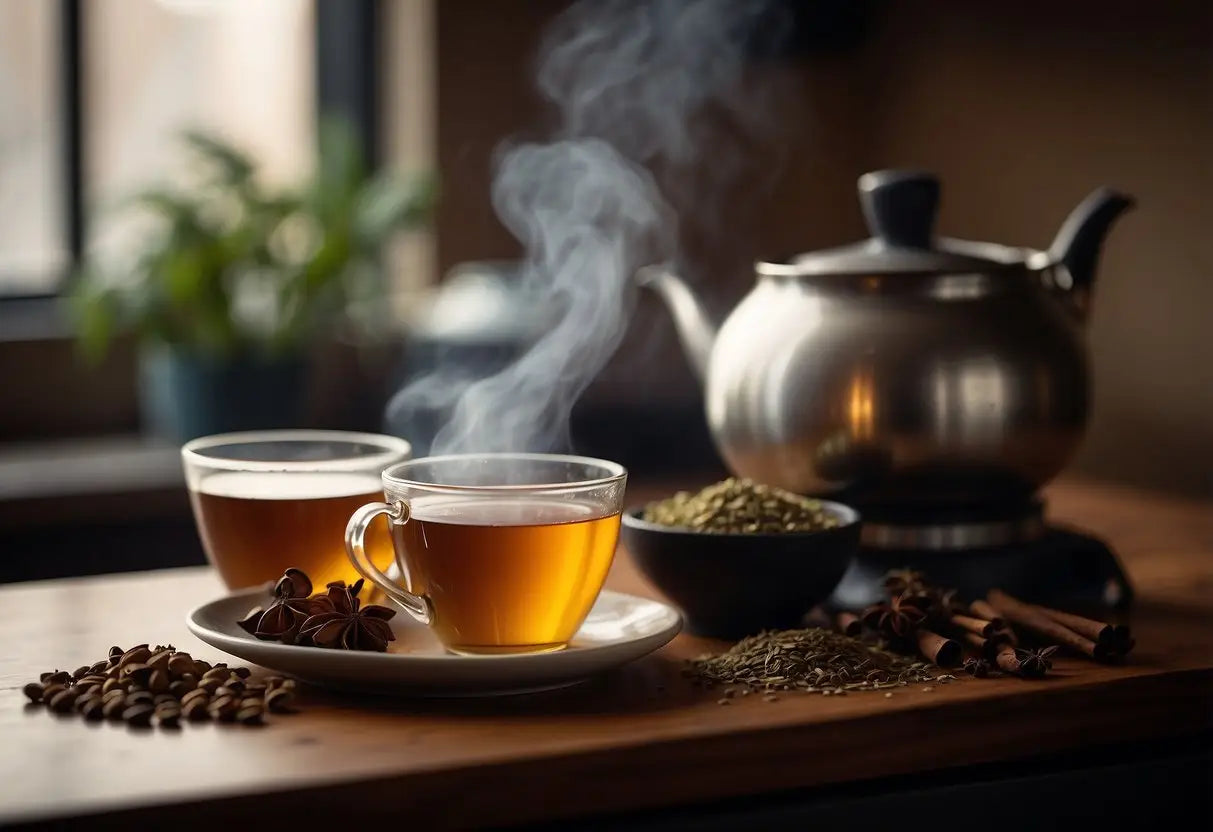
When preparing chai tea, several methods influence its caffeine content.
Traditional Method: This involves boiling black tea leaves with spices, milk, and a sweetener. Black tea is the primary source of caffeine, with about 47 milligrams per serving. Heating time and tea quantity affect the caffeine level.
Instant Chai Mix: These pre-made powders or concentrates often add black tea extract. Check labels for caffeine amounts, which can vary significantly.
Chai Tea Bags: Convenient and consistent, standard chai tea bags typically contain 30-60 milligrams of caffeine. Steeping time and water temperature influence the final caffeine content.
| Method | Average Caffeine Content per Serving |
|---|---|
| Traditional | 47 mg |
| Instant Mix | Varies |
| Tea Bags | 30-60 mg |
To control caffeine intake, you can adjust the brewing time or opt for decaffeinated chai options.
Tips for Reducing Caffeine in Chai Tea
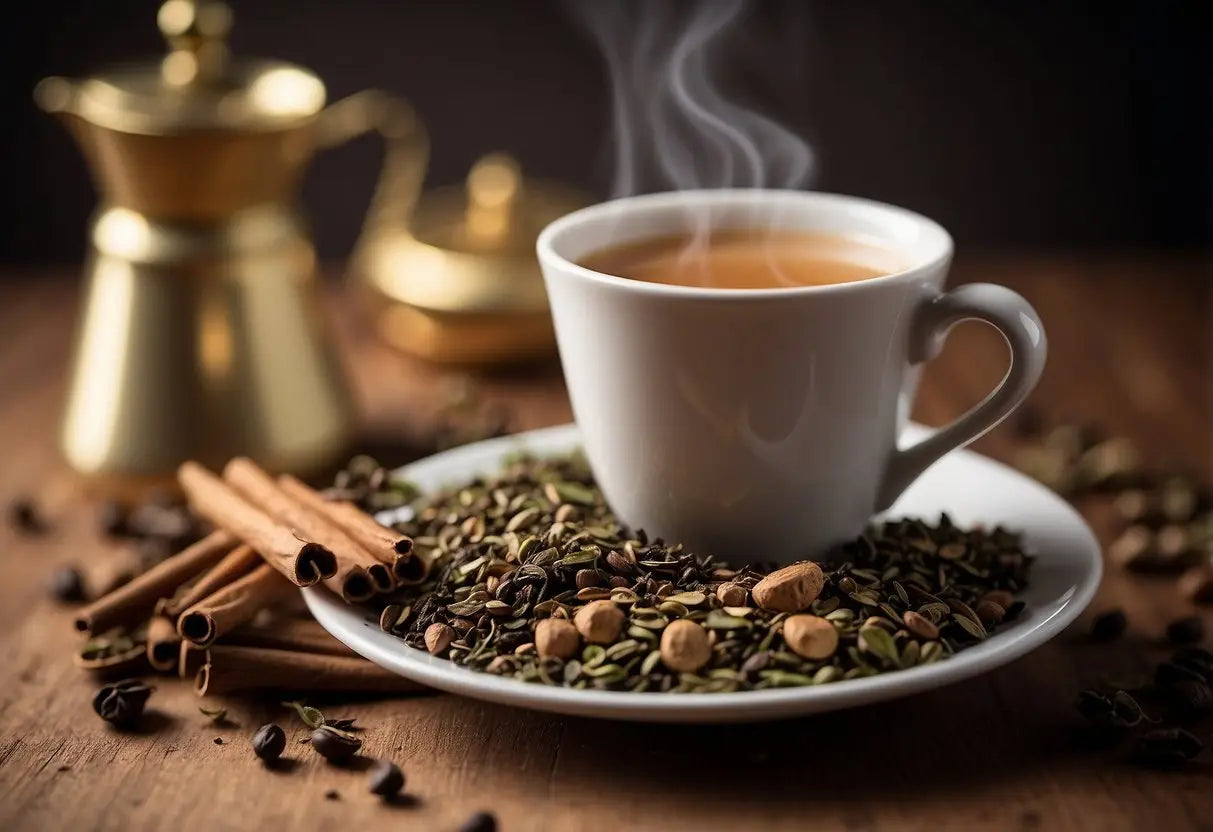
Opt for Decaffeinated Tea Leaves
Decaffeinated tea leaves have significantly less caffeine. You can maintain the chai flavor without the stimulating effects by using these leaves.
Blend with Herbal Teas
Mix regular chai tea with herbal teas like rooibos or chamomile. This can dilute the caffeine content while still providing a rich, flavorful experience.
Shorten the Steeping Time
Reducing the steeping time of tea leaves can lessen caffeine extraction. Aim for steeping your tea for three minutes or less.
Use Fewer Tea Leaves
Using fewer tea leaves will naturally result in less caffeine in your chai. Start with half the typical amount and adjust to taste.
Green tea has less caffeine than black tea. Opting for a green tea chai blend can reduce your caffeine intake while still enjoying a tasty beverage.
Add More Milk
Increasing the milk-to-tea ratio can dilute the caffeine content per serving. Adding more milk can make a creamier chai with less caffeine.
Cold brewing tea extracts less caffeine than hot water brewing. Let tea leaves steep in cold water overnight for a lower-caffeine chai option.
← Older post Newer post →











